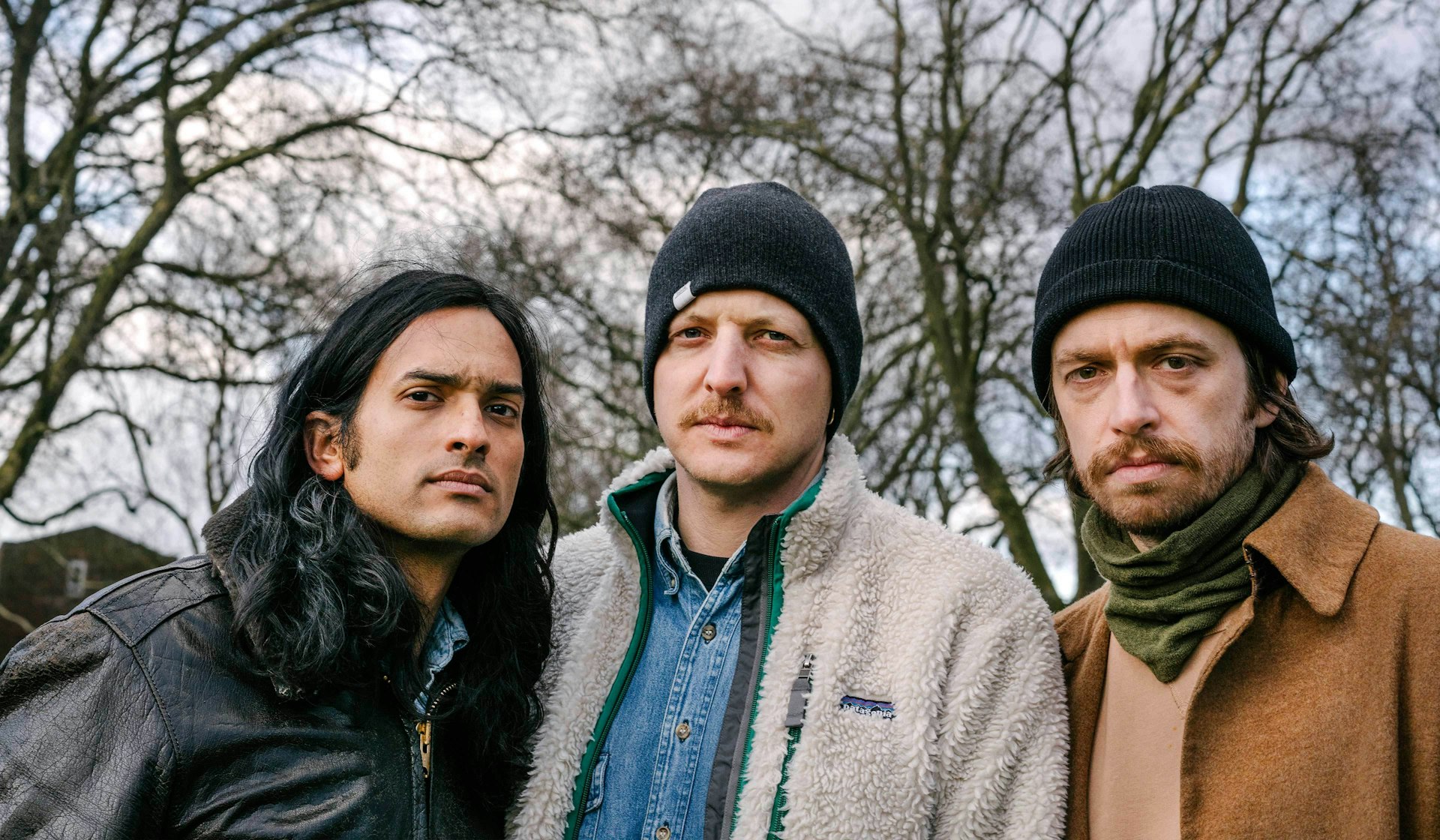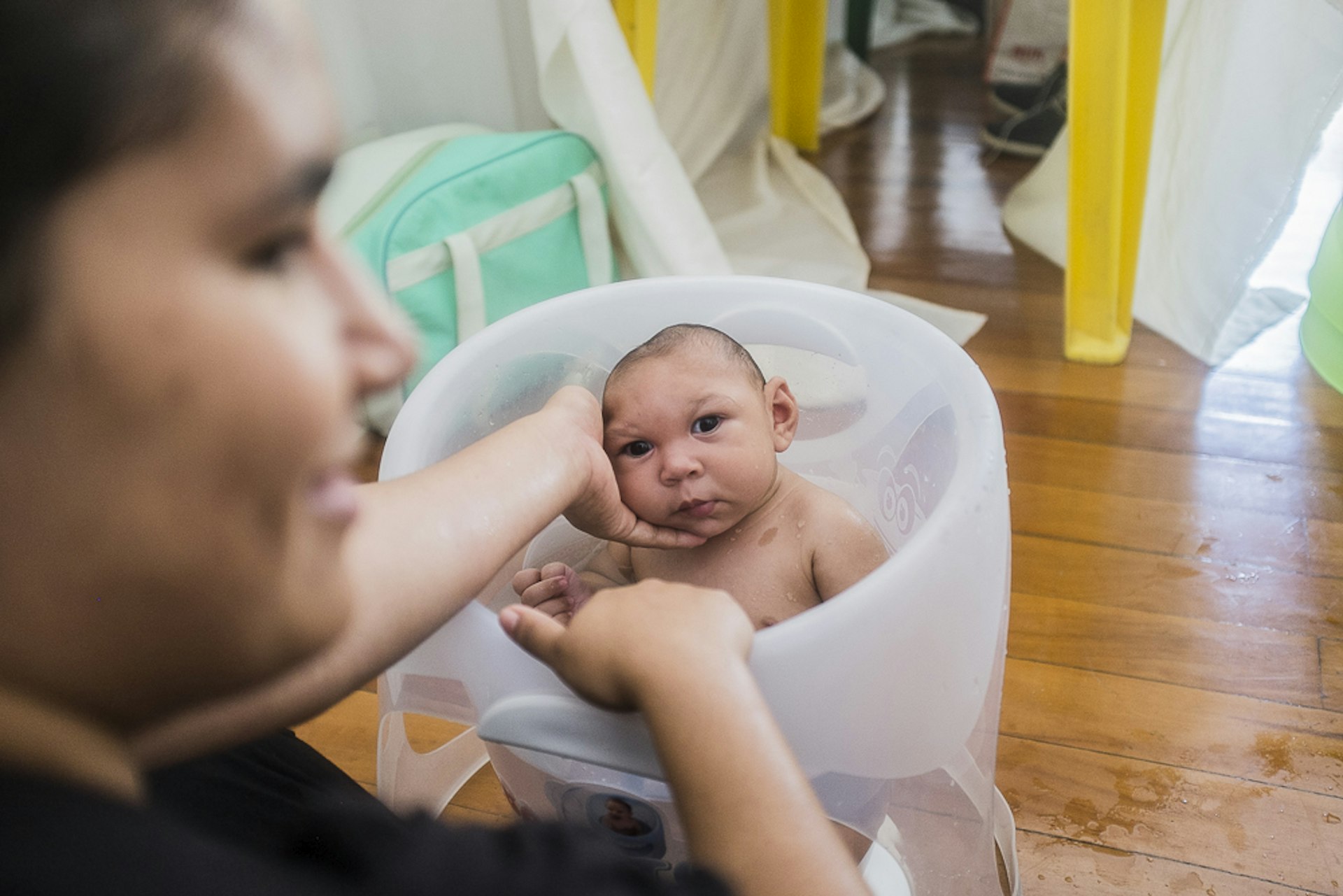
The Brazilian mothers taking on the state to fight for the future of their children
- Text by Kevin Damasio
- Photography by Giulio Paletta
Susana da Silva tries to figure out a comfortable position for her son Willian, who rests limply on her left arm. It was right after labour when the doctor first raised suspicions of microcephaly, as the newborn had a head size of 32 centimetres, close to the measurement the World Health Organisation (WHO) classifies as an anomaly (31.9 cm for boys, 31.5 cm for girls).
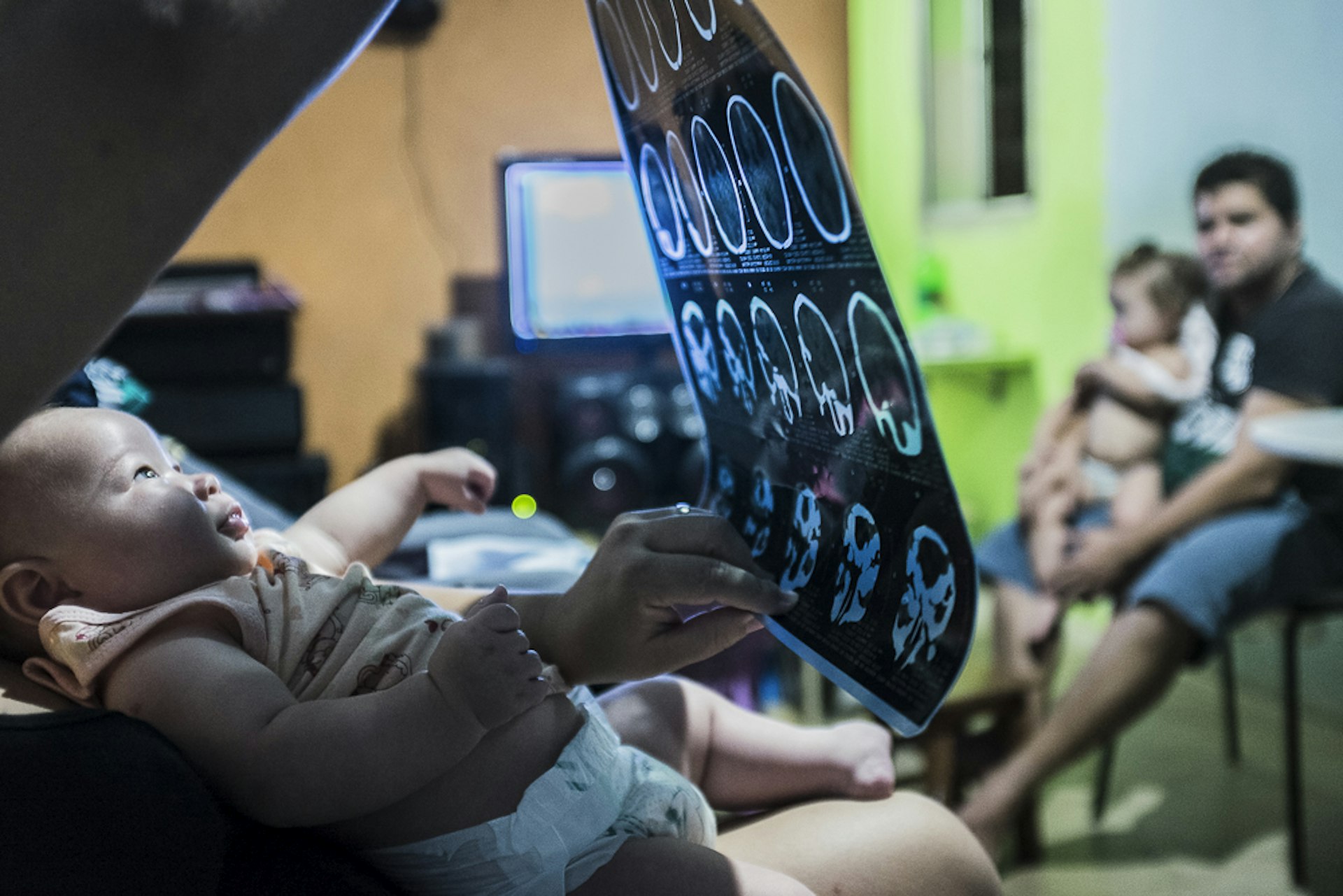
Susanna with her husband looking at Willian’s tomography
The news caught this new mother by surprise, as her son looked completely healthy on the surface. Shortly afterwards, a tomographic scan detected small white stains on his brain –calcifications that confirmed the diagnosis. “When I learned about it, it was like my world had ended,” the 25-year-old tells me. “But today I know things are not like what I thought. Despite the physical and psychology exhaustion, we have to keep going.”
It’s a Saturday night in Recife, the state capital of Pernambuco in northeastern Brazil. In her living room Susana has finally managed to find some time to lie down. She’s slouched beside her 32-year-old husband Anderson José, and their daughter Ana Beatriz who’s almost two. Since Willian was born three months earlier, Susana has faced a daily onslaught of buses and hospitals with the family’s youngest member. The father works from Sunday to Sunday as a baker to keep them afloat, while Ana Beatriz has been staying with her paternal grandmother as her family have been rushed off their feet. It’s been hard.
“Sometimes you just want to stop, to forget about the burden a little bit, but there’s just no time”, sighs Susana. “We have got to think positively, that he’s going to have a normal life”, Anderson jumps in.
Willian’s neurologist says the calcification on his brain is light, and his observations point to Willian making steady progress. “This is what brings most relief to us – that he’s going to develop, walk, speak”, observes Susana.
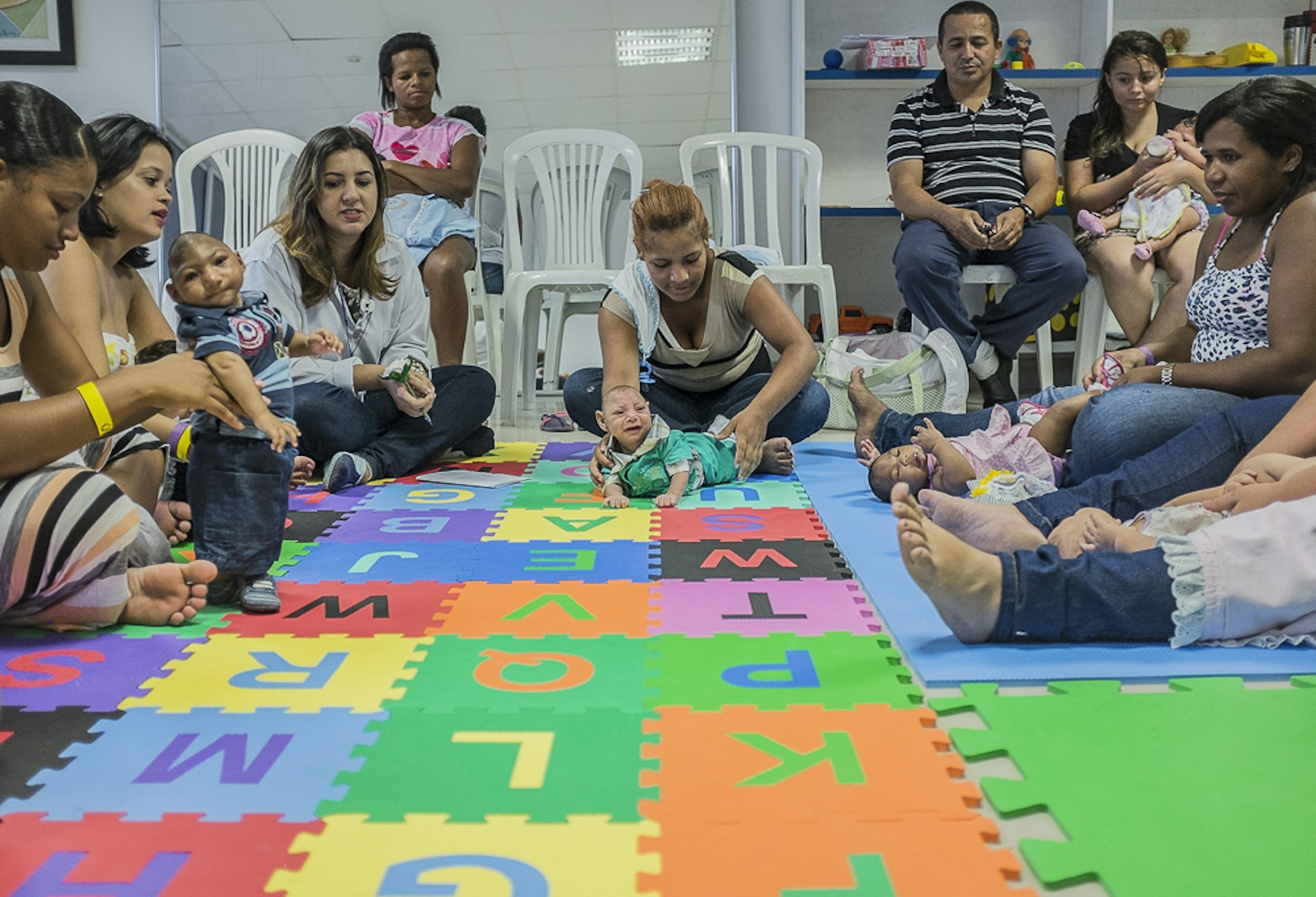
Fundação Atilio Valente
Susana and Willian have spent every Thursday morning for the last few months at the Altino Ventura Foundation (FAV), where a free, multidisciplinary rehab centre takes place. To date 113 babies have joined this programme; and currently another 122 are waiting for a spot.
The doctors investigate the symptoms through a series of examinations (tomography, LCR, electroencephalogram, electrocardiogram). In empowerment and support groups 72 parents attend classes where they learn about their kids’ early development. They’re taught skills to stimulate and support their children, as well as participating in therapy sessions themselves.
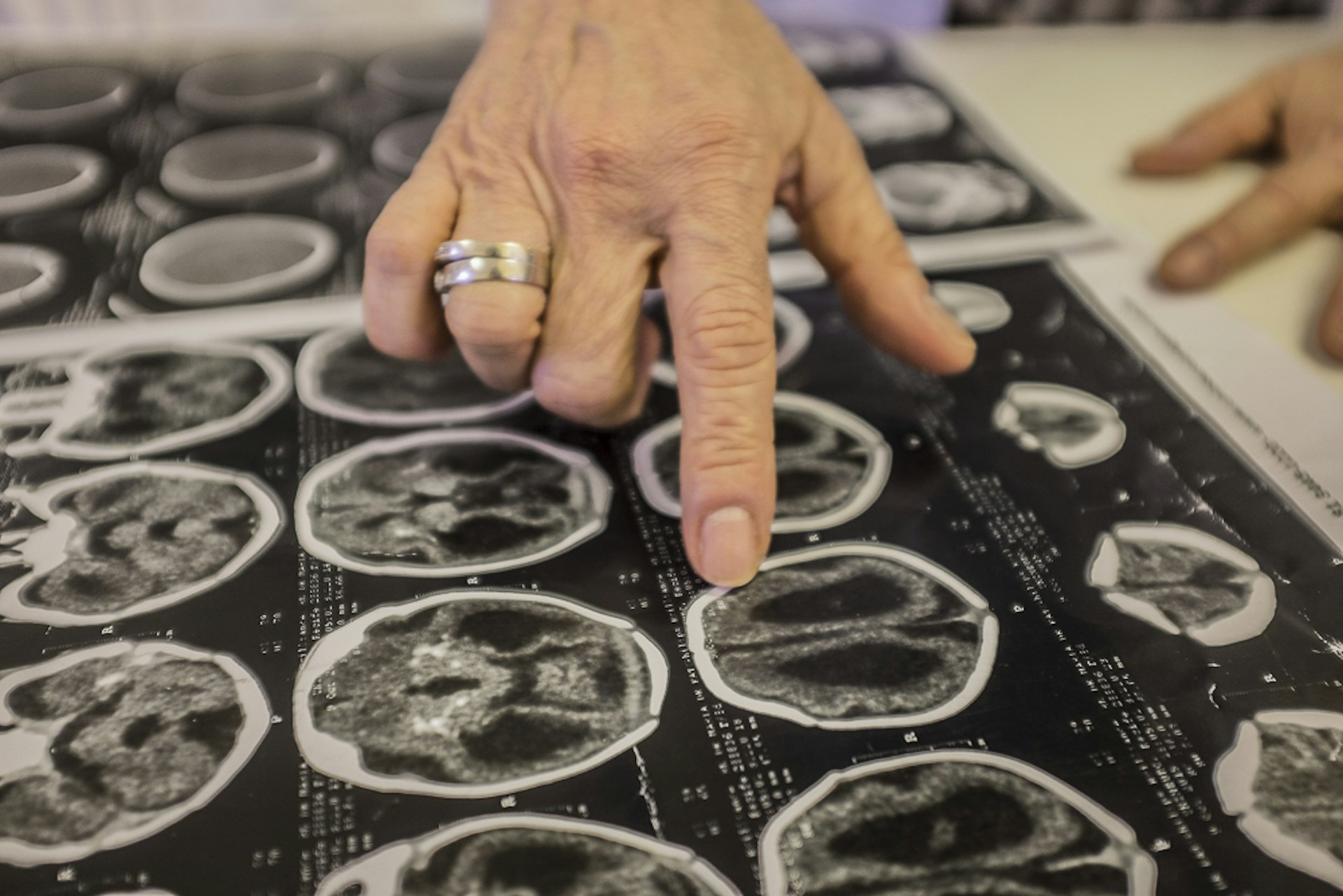
Susana feels her son has been making good progress. “During his first two months of life, he was stiffer, and never smiled. In his third he started to get better,” she tells me, while showing us some exercises she’s been putting into practice at home. Willian laughs out loud during one physiotherapy session I witness. “If there’s evolution every month, there’s still hope, right? Our happiness comes from seeing his development.”
Susana lives with her family in Várzea, a poor district in Recife. An outbreak of the Aedes aegypt mosquito made a good part of the neighbourhood sick back in 2015. Susana was going through her fifth month of pregnancy when she noticed the symptoms: a rash, her eyes were red. A blood test revealed this was caused by a virus, ruling out the possibility of dengue or chikungunya. At that time, zika was only just making its way into the Brazilian consciousness. She had no idea.
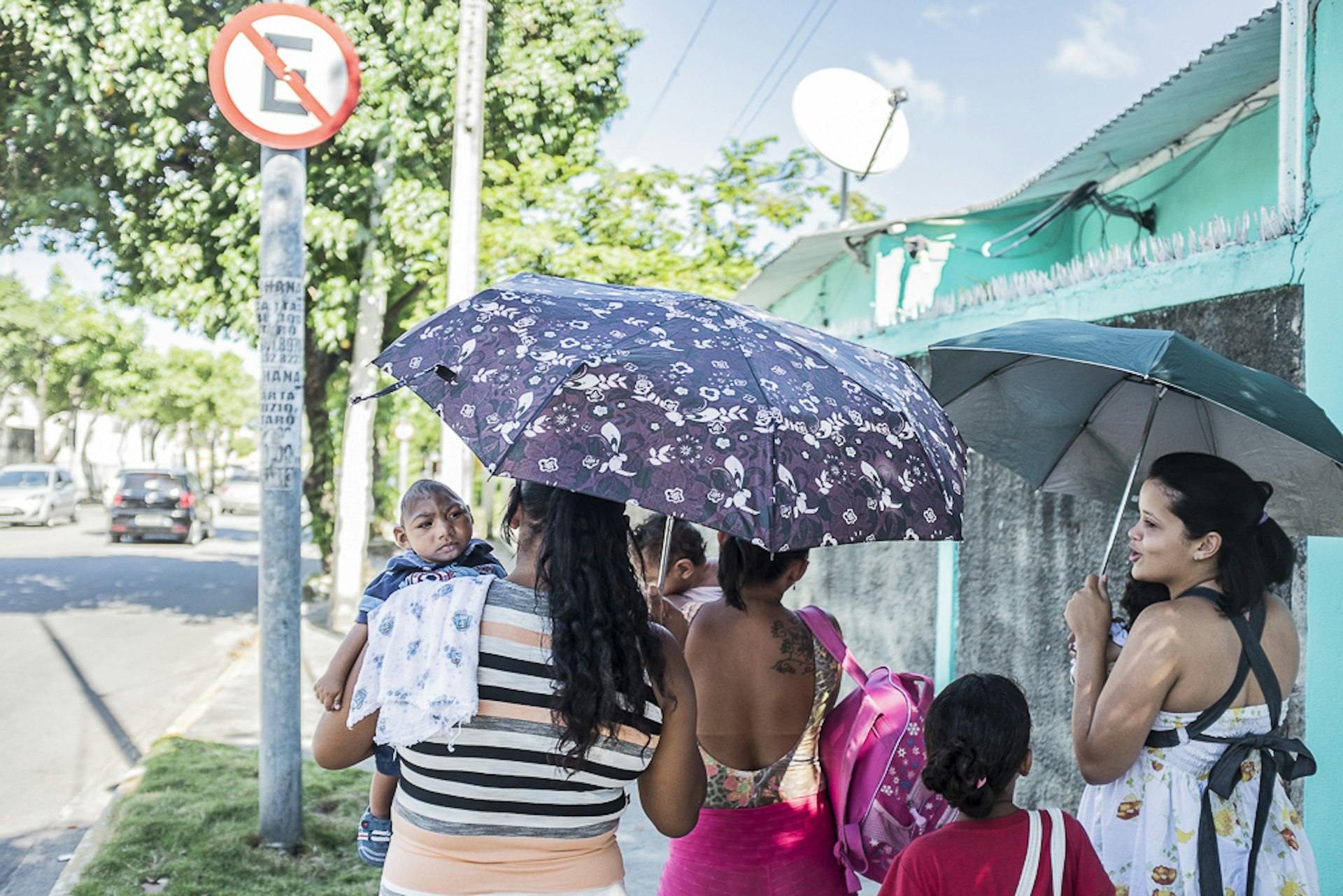
In April 2015, the Brazilian Ministry of Health confirmed that the zika virus had started being transmitted within its borders. In just one year, 91,387 cases of fever, caused by the zika virus, were suspected in Brazil; 31,616 (34.59%) of them were confirmed. In September, babies began to born with microcephaly or other malformations.
The doctors suspected it was the zika virus once other known causes of microcephaly were being ruled out (rubella, cytomegalovirus, viral herpes, syphilis, toxoplasmosis). On 13 April, the American Centers For Disease Control and Prevention (CDC) confirmed the link between these two outbreaks.
What makes this whole situation trickier to navigate for Brazilians is that four in five people infected by zika show no symptoms whatsoever. For Jaiane Santos, 17, this was precisely the situation she found herself in.
Jaiane learned she had contracted zika after a routine blood exam during pregnancy. Nobody knew about the virus in the village of the Xukuru tribe, where she lives with her husband Daniel Santana, 20, her first son David, 3, and Nathally Vitória, who was born in October. Nathally is the only known indigenous person in Brazil thought to have been diagnosed with microcephaly.
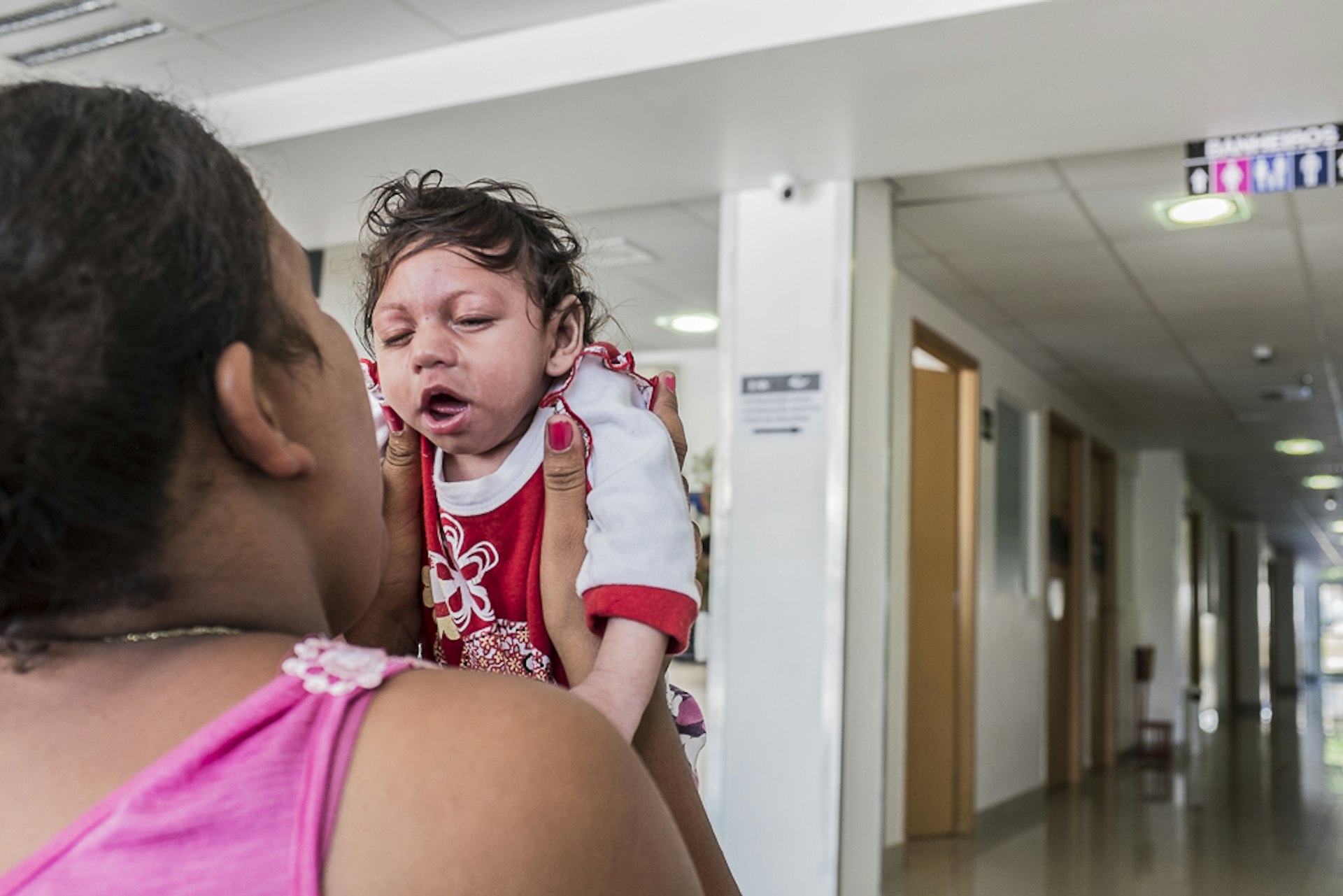
Jaiane and her her daughter Nathally
The family regularly endures a rough three-hour bus ride to Recife in search of treatment. Jaiane felt progress was being made on their first day in Altino Ventura Foundation: “She’s already responding more to sounds. It’s great to get good news.”
Pernambuco state has the sixth lowest rate of zika fever in Brazil (333 cases). At the same time it’s the highest for microcephaly and other malformations. By 30 April 2016, 339 suspected cases were confirmed (26.67% of the country’s total) and another 653 are still being investigated.
As Dr Ângela Rocha sees it, this state is more susceptible to this outbreak for multiple reasons: greater body exposure due to the high temperatures, the poor basic sanitation, and socio-economic factors – most cases have occurred among lower-income families.
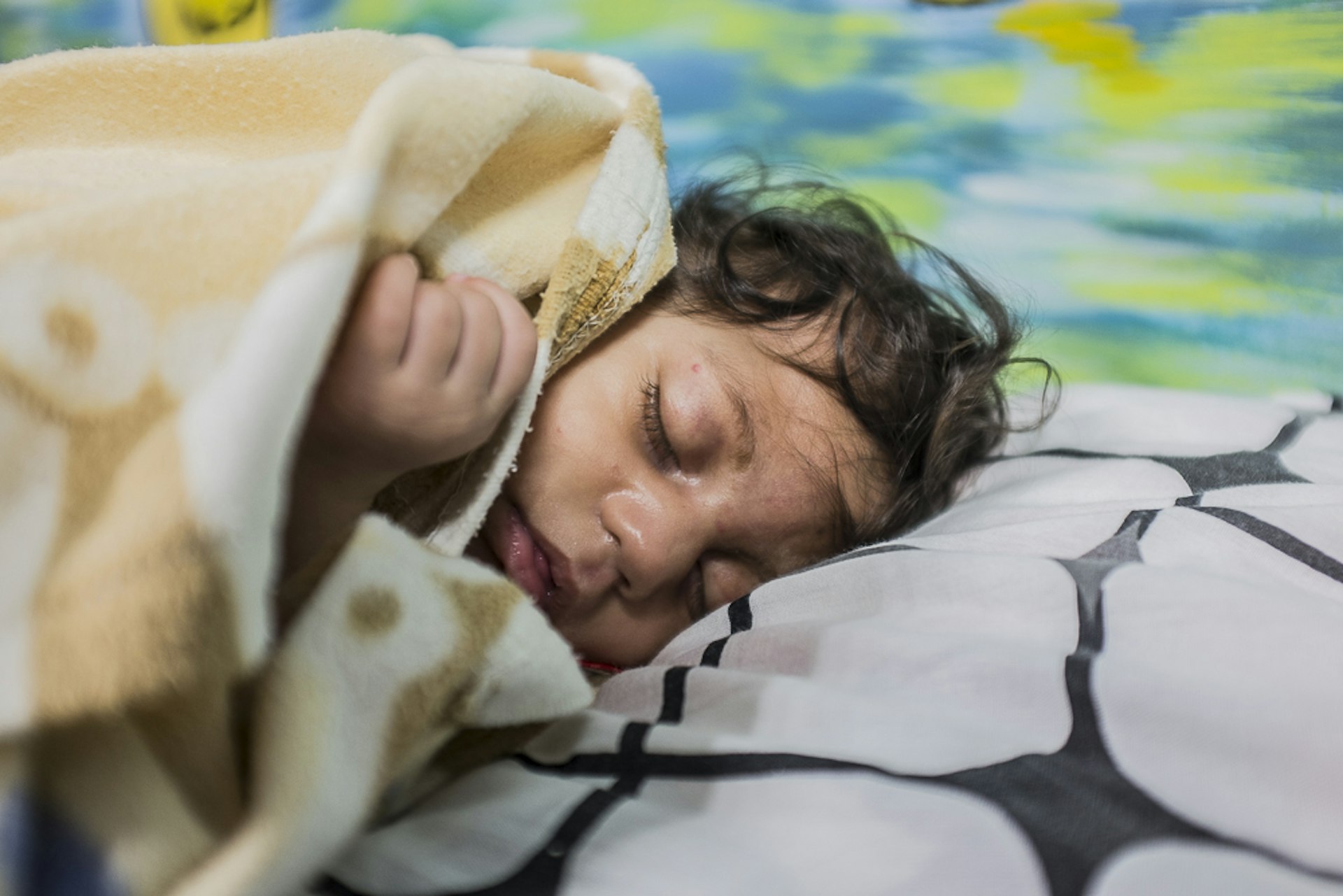
Nathally
Maria de Fátima, 20, and Paulo Rogério, 49, live in a wooden barraco at the slum of Santa Luzia, Recife. The very same day that their daughter Eduarda Vitória was born in October 2015, Maria decided to break a vicious cycle of drug taking.
Her parents had died when she was just a child, and by the time Maria turned four she was living on Recife’s busy streets, and she soon became addicted to crack cocaine. Her life started changing three years ago, when she and Paulo got married and moved in together. The birth of her first child meant the world. However, due to this routine full of medics, their now one-and-a-half-year-old daughter had to live with her paternal grandmother in Boa Viagem, 11 kilometres away.
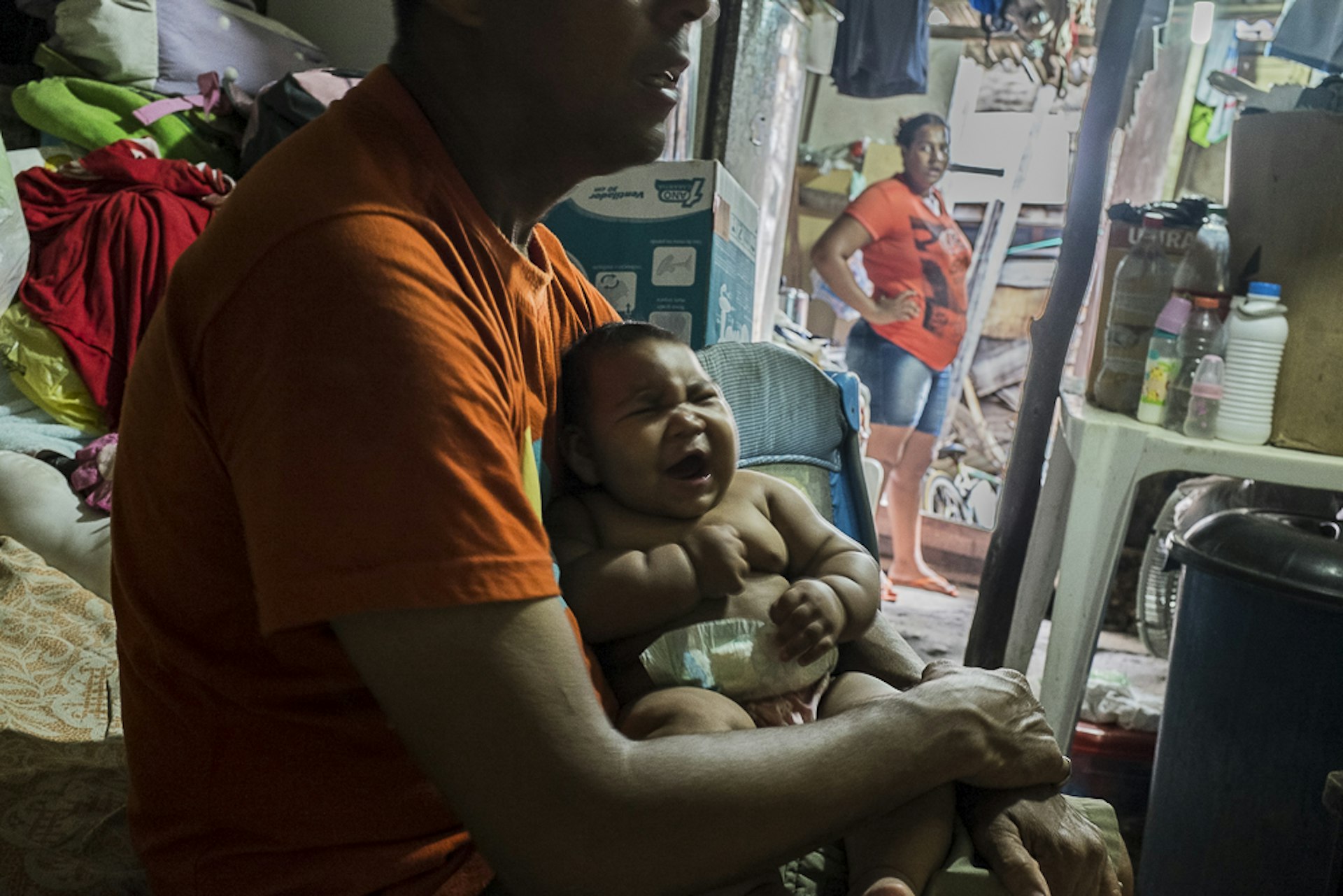
Paulo and Eduarda Vitoria
“This is too new to me, dealing with this whole situation”, says Maria. “Sometimes I freak out, cry my eyes out, but my husband always cheers me up, he helps me.”
This daily struggle made Paulo turn down a much needed job offer in a bakery. Without an income, he requested financial help for Eduarda, from the government’s National Institute of Social Security (INSS). If successful, they’d receive a monthly support payment of R$ 880, or £176. “If it didn’t work, I had no idea know what else we are going to do.”
Germana Soares, 24, is the mother of six-month-old Guilherme. Guilherme has microcephaly too. Germana was initially told she would have to wait at least four months for her appointments with the INSS to secure the money she so desperately. “Many mothers quit work to take care of their children, many fathers are unemployed. So we need this benefit, because the cost to look after our children is high: bus tickets, food, exams, medicine…”
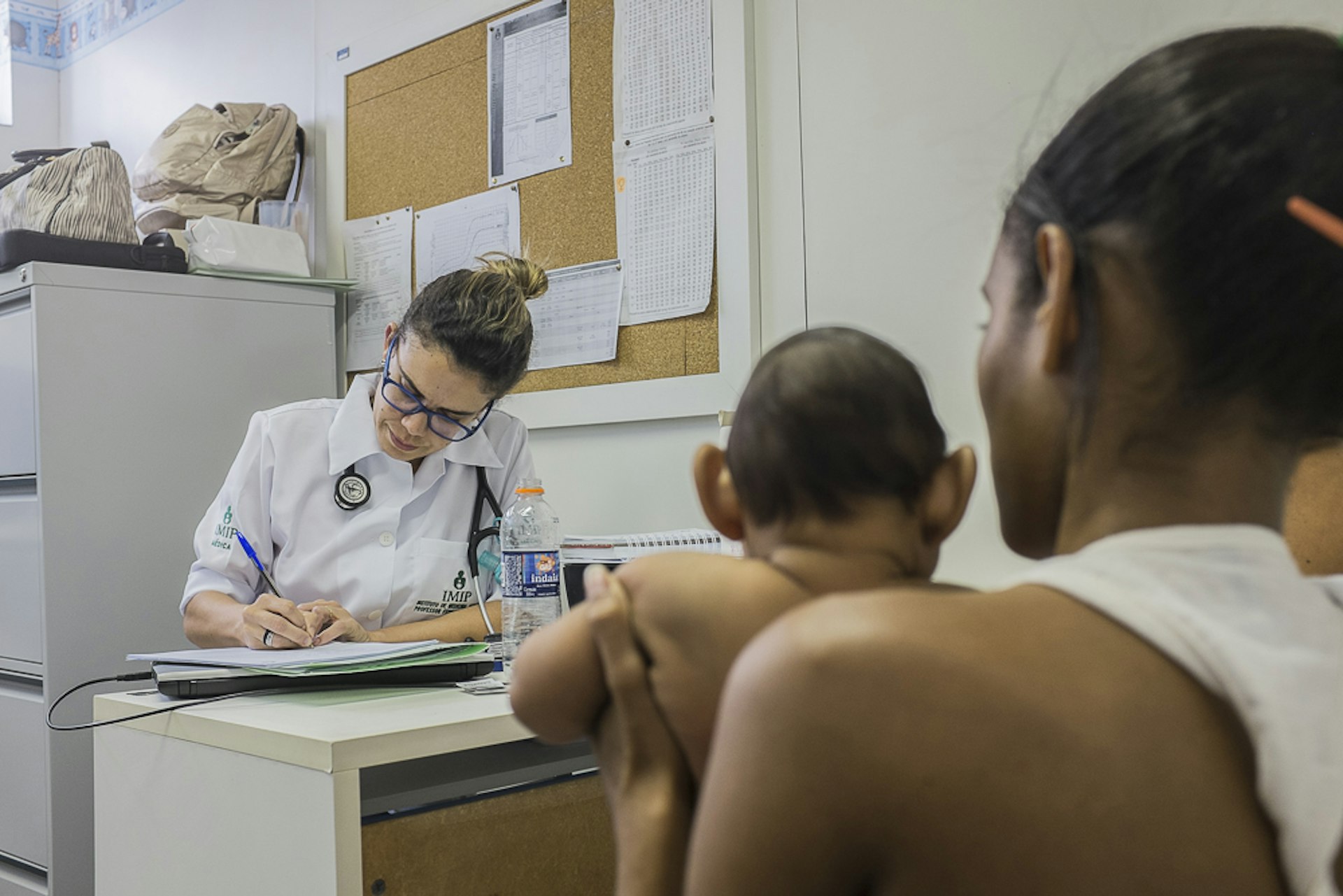
She had to throw in the towel as a real estate to dedicate herself full-time to her only son’s treatment, and to the presidency of Mothers of Angels Union (UMA). Her husband, in turn, recently got fired and now has to live on casual jobs.
Germana founded UMA to take action for the sake of her son’s future, and other children born with microcephaly too. To date, more than 130 families are a part of it. By meeting with politicians and refusing to not be heard, these women have secured a better future for their families.
Their campaigning helped to speed up the financial assistance requests – the institute agreed to work on a Saturday, cutting down the slow, bureaucratic procedure. They’ve won free bus tickets, as well as a service called PE-Conduz, in which town cars take parents and their children with microcephaly to the hospital.
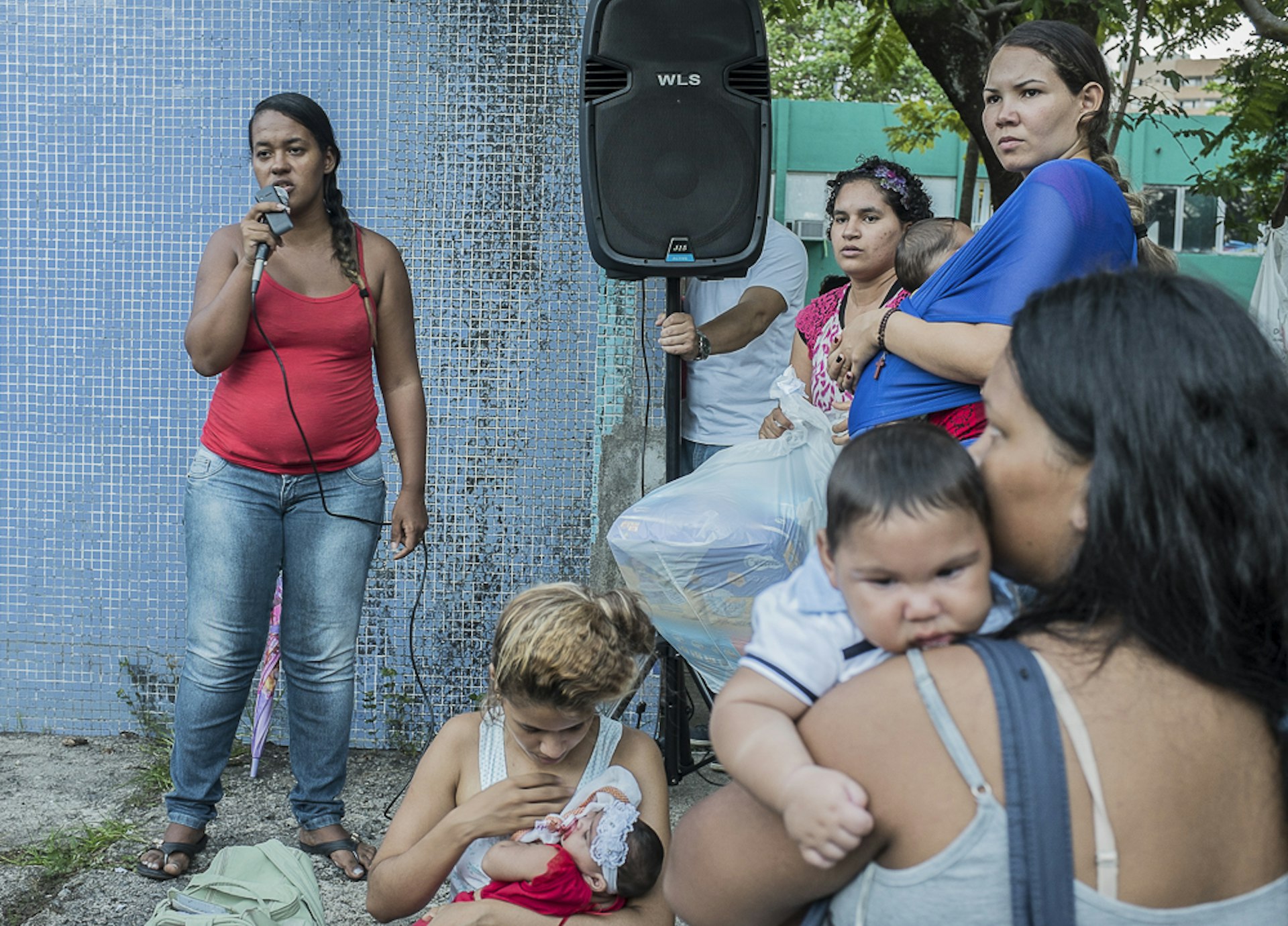
A meeting of the UMA
Besides political pressure, the mothers of angels also exchange information, experience and, more importantly, psychological support. “We’re over that time when a family of a baby with micro was considered ‘poor and sad’. In reality, it was never like that. We want to show everyone our strength.”
The group also holds a monthly meeting of parents and children, in which they register more mothers and kids, and distribute kits according to the needs of each individual baby and family. They hand out special milk, baby bathtubs, medication and toys – all thanks to donations. Much of their organising is done via Whatsapp.
UMA’s secretary is 25-year-old Jaqueline da Silva, mother of João Pedro, 4, and 4-month-old Daniel. Daniel as a severe case of microcephaly, but his INSS request haven’t moved forward, because Jaqueline already receives health assistance due to a diagnosis of cancer in 2013. Now she’ll be challenging the state in court.
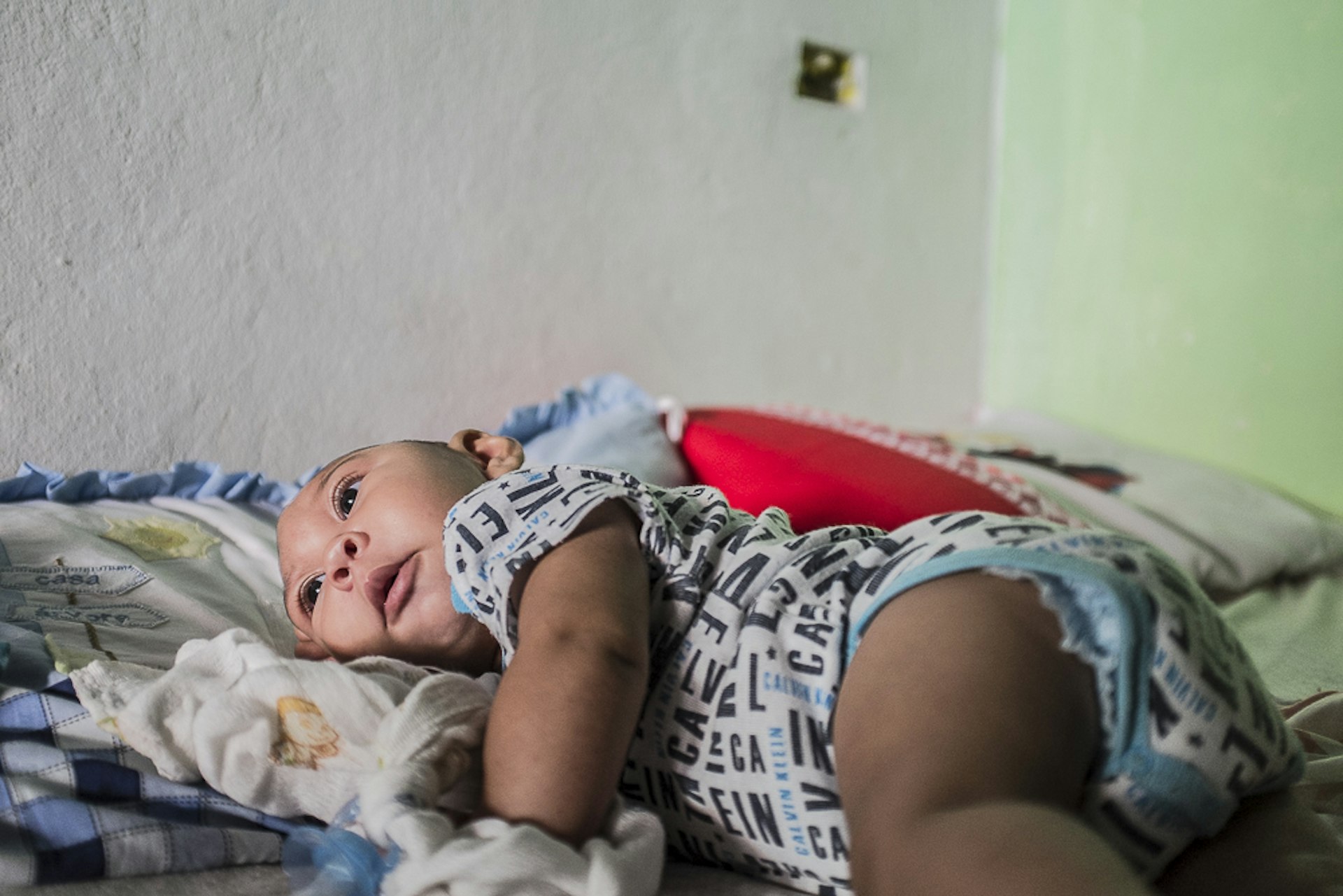
Daniel
Meanwhile, she has to split her monthly R$ 880, or £176, between medicine, food, water, electricity and the rent for her one-story household, where she lives with her sons. She and her husband got divorced when he refused to accept a son with microcephaly.
Jaqueline takes three buses to get to the public hospitals and to work on UMA’s actions, in Recife. It’s a relentless routine, but she somehow remains in good spirits. “I believe my secret is God. Even when I had the cancer, I was never discouraged, never cried about it. Everything has an explanation. If He gave me Daniel, it means that I have the tools to handle the pressure. Now I’m going to take a bath and go out with my sons. I don’t care about feeling tired – not at all.”
Enjoyed this article? Like Huck on Facebook or follow us on Twitter.
